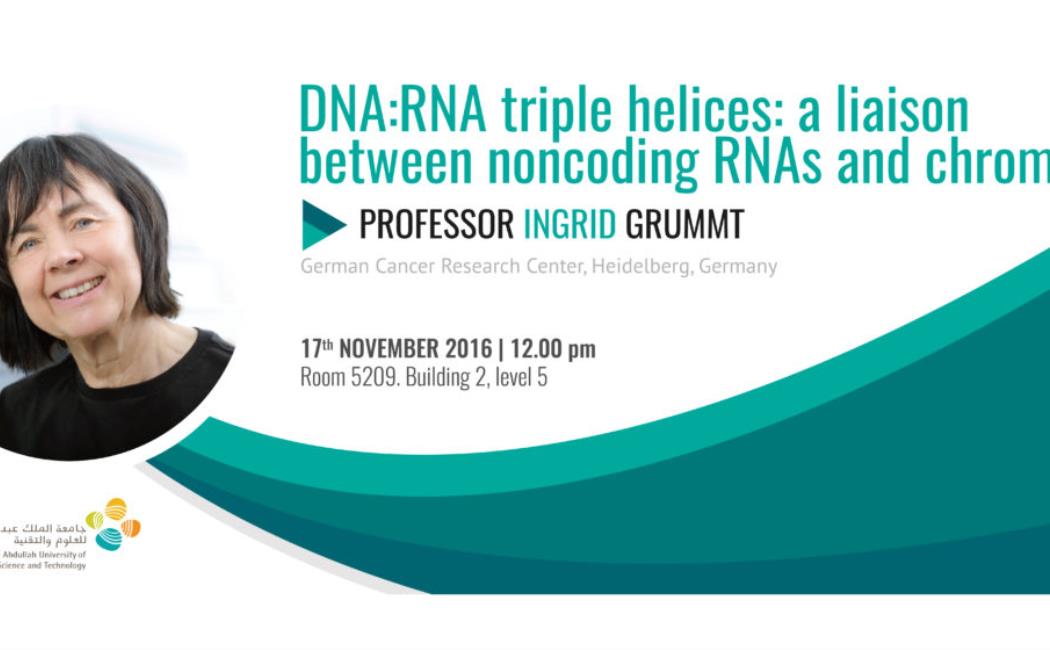
DNA:RNA triple helices: a liaison between noncoding RNAs and chromatin
Long noncoding RNAs (lncRNAs) can directly interact with homopurine stretches in DNA, forming a DNA:RNA triple helical structure that anchors the RNA to specific sequences and guides chromatin-modifying proteins to distinct gene loci. We have functionally characterized Khps1, an E2F1-regulated long noncoding RNA, which activates expression of the proto-oncogene SPHK1. We show that Khps1 interacts with a homopurine stretch upstream of the transcription start site of SPHK1, forming a DNA:RNA triplex that tethers Khps1 to SPHK1 and guides Khps1-associated p300 to the SPHK1 promoter. p300-dependent histone acetylation leads to local changes of the chromatin structure that ensures E2F1 binding and enhances SPHK1 transcription. The results reveal a lncRNA- and E2F1-driven regulatory loop that alters the chromatin structure and activates SPHK1 expression, thereby impairing E2F1-induced cell death.
To examine whether lncRNA-mediated triplex formation is a general mechanism of epigenetic regulation, we have established a genome-wide method (TriplexRNA-seq) for the isolation of chromatin-associated RNAs that bind DNA directly via triplex formation. Ultimately, the identification of their DNA-targets will give us information about the functions of many lncRNAs and their role in epigenetic regulation.
Biosketch: Prof. Dr. Ingrid Grummt is Head of a Research Division at the German Cancer Research Center and Professor for Molecular Biology at the University in Heidelberg. Prior to joining the German Cancer Research Center, she was a post-doctoral fellow at the German Academy of Sciences in Berlin and the Max-Planck-Institute of Biochemistry in Munich, and led a research group at the University in Würzburg, Germany. She is married, has one daughter and two grandsons. Ingrid Grummt works on the molecular mechanisms that regulate gene expression. The main focus of her research is the elucidation of the regulatory networks that link gene expression to cell growth and proliferation. Her group has deciphered the molecular pathways by which extracellular signals are transferred into the nucleus to modulate transcription in response to environmental changes and during cell cycle progression. The main focus of her present research concerns the molecular mechanisms that control gene expression at the epigenetic level. Her studies greatly contribute to our understanding of the cellular processes by which a specific chromatin structure is established, maintained and inherited through cell divisions. The elucidation of these regulatory processes is fundamental for the understanding of how epigenetic defects cause human diseases and will be instrumental in facilitating therapeutic strategies in the future. Ingrid Grummt is member of the European Molecular Biology Organization (EMBO), member of several scientific advisory boards, member of the Academia Europea and the German Academy of Sciences Leopoldina, She has been honoured for her major contributions by prestigious awards, such as the Science Prize of the Fritz-Winter-Foundation, the renowned Gottfried Wilhelm Leibniz-Prize for German scientists, the FEBS/EMBO Women in Science Award, the INSERM “Prix International”, and the Schleiden-Medaille of the German Academy of Sciences Leopoldina.